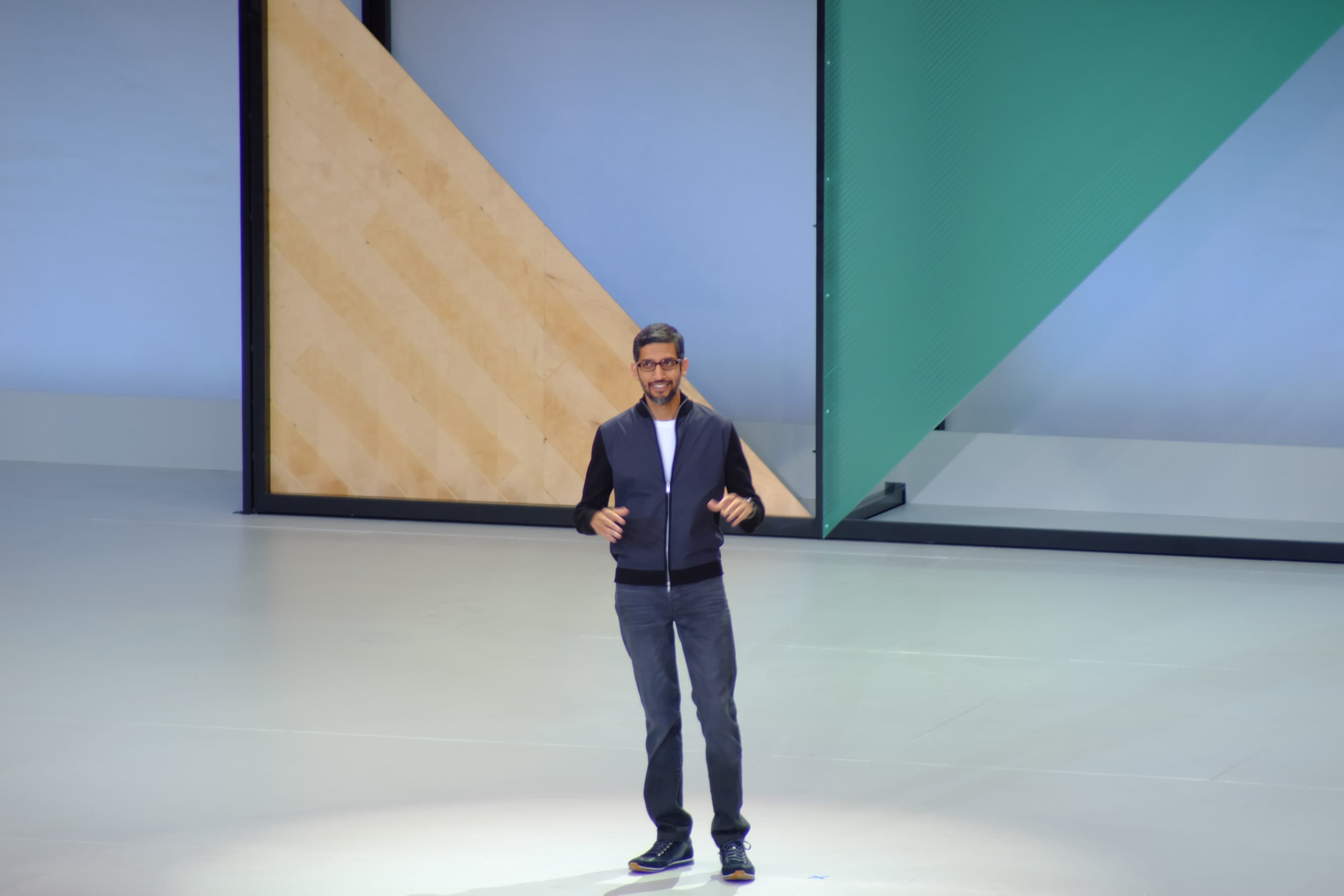Google CEO Sundar Pichai has made a surprising announcement about the future of artificial intelligence. AI development is expected to slow down in 2025, as the industry faces new challenges in advancing the technology. This statement comes after years of rapid progress in AI capabilities.
Pichai explains that the “low-hanging fruit” in AI research has been picked, and future advancements will require deeper breakthroughs. The focus is now shifting towards improving AI reasoning and completing complex tasks reliably. This change in pace could have significant implications for tech companies and AI researchers.
Despite the slowdown, Pichai emphasizes that progress is not stalling entirely. The AI industry continues to move forward, but at a more measured pace. This new phase may lead to more thoughtful and targeted developments in artificial intelligence.
Image Credit: Steven Zimmerman, CC BY-SA 4.0 https://creativecommons.org/licenses/by-sa/4.0, via Wikimedia Commons
The Next Chapter of AI: Beyond the Low-Hanging Fruit
Sundar Pichai, the CEO of Google and Alphabet, recently made headlines by suggesting that the breakneck speed of AI development is slowing down. But don’t worry, this doesn’t mean that AI is going away. Instead, it signals a shift towards a new phase in the evolution of artificial intelligence.
The End of Easy Wins
Pichai’s statement that “the low-hanging fruit is gone” implies that the initial wave of rapid advancements in AI has reached its peak. We’ve seen incredible progress in areas like image recognition, natural language processing, and content generation. These were relatively easier problems to solve. Now, researchers are facing more complex challenges that require deeper exploration and more fundamental breakthroughs.
A New Phase of AI Development
This new phase of AI development will likely focus on tackling harder problems, such as:
- Improving Reasoning and Logic: Current AI models excel at pattern recognition, but they still struggle with complex reasoning and understanding nuanced situations. Future research will likely focus on enhancing AI’s ability to think more critically and logically.
- Enhancing Creativity and Innovation: While AI can generate creative content, true innovation and groundbreaking ideas might require a deeper level of understanding and cognitive ability. Researchers are exploring ways to make AI more creative and innovative.
- Addressing Ethical Concerns and Biases: AI models can inherit biases from their training data, leading to unfair or discriminatory outcomes. This new phase of AI development will prioritize addressing these ethical concerns and ensuring fairness and inclusivity.
What to Expect in the Future
This shift in AI development doesn’t mean progress is stopping. Instead, we can expect to see:
- Slower, More Meaningful Progress: The pace of flashy new AI demos might slow down, but research and development will continue to deepen our understanding of AI and lead to more impactful applications in the long run.
- Focus on Real-World Impact: We can expect to see more emphasis on using AI to solve practical problems in areas like healthcare, education, and climate change.
- Increased Collaboration and Responsible Development: Addressing the ethical challenges of AI will require collaboration between researchers, policymakers, and the public. Responsible development will be a key priority.
Future Outlook
| Current State | Future Outlook |
|---|---|
| Rapid advancements in basic AI capabilities | Focus on deeper, more complex challenges |
| Emphasis on flashy demos and new features | Emphasis on real-world impact and ethical considerations |
| Potential for rapid progress | Slower, but more meaningful advancements |
The future of AI is still full of potential. This new phase of development promises to bring even more exciting and impactful applications, but it will require a more thoughtful and collaborative approach.
Key Takeaways
- AI development is expected to slow down in 2025 due to increased challenges
- Future AI advancements will focus on improving reasoning and complex task completion
- The industry continues to progress, but at a more measured pace
Assessment of Artificial Intelligence Progress
While the rapid-fire advancements in artificial intelligence might be slowing down, this doesn’t signal a standstill. Instead, it marks a pivotal turning point, a shift from focusing on easily attainable goals to tackling the truly complex challenges that lie ahead. Think of it as AI growing up – moving beyond the basics and into a phase of deeper learning and understanding. This new era promises to be less about flashy demos and more about creating AI that truly benefits humanity, solving real-world problems and pushing the boundaries of what’s possible.
AI development has reached a critical juncture, with signs of slowing progress and emerging challenges. The field faces new hurdles as it moves beyond initial breakthroughs.
Factors Influencing AI Development Pace
Google CEO Sundar Pichai notes that AI progress is decelerating. The “low-hanging fruit” in AI research has been picked, leading to a slowdown in easy wins.
Researchers now encounter more complex problems requiring deeper scientific breakthroughs. This shift demands greater resources and time investments for meaningful advancements.
AI faces scaling challenges as models grow larger. Improvements from simply increasing model size are diminishing, pushing researchers to explore new architectures and training methods.
Computational limits also constrain progress. Even tech giants like Google struggle with the massive computing power needed for cutting-edge AI experiments.
Indicators of a Maturing AI Field
The AI industry shows signs of maturation. Early rapid advancements have given way to a more measured pace of innovation.
Key indicators include:
- Plateauing performance in some AI benchmarks
- Longer intervals between major breakthroughs
- Shift from general-purpose models to specialized AI systems
- Increased focus on AI safety and ethics
Experts like Ethereum co-founder Vitalik Buterin and former OpenAI chief scientist Ilya Sutskever agree that AI scaling based on massive unlabeled datasets has reached a plateau. This suggests the need for new approaches to push AI capabilities further.
The field now prioritizes refining existing technologies and addressing real-world applications. This marks a transition from pure research to practical implementation and commercialization of AI solutions.
Implications for the Tech Industry and AI Research
Google CEO Sundar Pichai’s prediction of slowing AI development impacts tech companies and researchers. This shift affects resource allocation and strategic planning across the industry.
Shifts in AI Infrastructure and Investments
AI development costs may increase as progress becomes more challenging. Companies might redirect funds to optimize existing AI models rather than create new ones. This could lead to a focus on refining current AI tools instead of breakthrough innovations.
Data centers may see changes in expansion plans. Tech giants might slow down their infrastructure growth, affecting the entire supply chain for AI hardware.
Investors may become more cautious about AI startups. Funding rounds could become more selective, favoring companies with proven applications over those promising radical advancements.
Strategic Responses from Major Tech Companies
Microsoft and OpenAI might adjust their partnership strategy. They could focus on integrating existing AI into more products rather than pursuing rapid advancements.
Meta may shift resources to enhance AI in current platforms. This could mean more AI features in Facebook and Instagram rather than developing new AI models.
Google might prioritize AI application in its core products. Search, ads, and cloud services could see more AI integration to maintain market leadership.
Smaller AI companies may need to pivot. They might focus on niche applications or partner with larger firms to remain competitive in a slower-growth environment.







